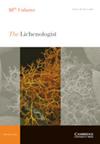管理和出版非洲传统真菌学和地衣学知识的科学数据
IF 1.4
4区 生物学
Q4 MYCOLOGY
引用次数: 0
摘要
非洲是关于真菌和地衣的生物、文化和传统知识的重要全球资源库,它们被用作食物、药物和神话等。非洲人口正在经历非常重大的变化和适应过程,伴随着快速的城市化,与西方文明相遇,大量农村移民和自然生态系统的丧失。土著知识正在流失,包括有关真菌和地衣的知识。民族学和民族学提供了有关有益和有毒真菌和地衣的多种知识,并深入了解它们对人类行为和使用的社会学影响。在这里,我们展示了一个使用Diversity Workbench软件建立的工作和出版环境,该环境符合FAIR指导研究数据提供的国家和国际倡议。这个名为“EthnoMycAfrica”的数据库应用程序包含了来自非洲的已出版的人种学和人种学信息。内容由来自非洲中部、东部、西部、北部和南部的团队合作伙伴创建和策划。数据输入可以在线或离线执行,也可以通过移动设备执行。目前,该系统与工具多样性描述和多样性导航共包含1350个结构良好,自由和公开访问的数据记录。EthnoMycAfrica是第一个主要由非洲学者创建的具有数据模式、标准描述符和数据内容的数据库。这些数据对研究人员、学生、环保人士、政策制定者和其他人都很有用。这也将为促进假设生成和元分析提供基础。本文章由计算机程序翻译,如有差异,请以英文原文为准。
Management and publication of scientific data on traditional mycological and lichenological knowledge in Africa
Abstract Africa is an important global reservoir for biological, cultural and traditional knowledge about fungi and lichens, which are used as food, medicine and in mythology, among other things. African human populations are undergoing highly significant changes and adaptation processes, which are accompanied by rapid urbanization, meeting with western civilization, high rural migration and the loss of natural ecosystems. Indigenous knowledge is being lost, including that concerning fungi and lichens. Ethnomycology and ethnolichenology provide a diversity of knowledge about beneficial and poisonous fungi and lichens, and give insights into their sociological impact on human behaviour and use. Here we present a working and publishing environment established with the Diversity Workbench software in line with national and international initiatives for FAIR guided provision of research data. The database application called ‘EthnoMycAfrica’ contains published ethnomycological and ethnolichenological information from Africa. The content is created and curated by team partners from Central, East, West, North and Southern Africa. Data entry is performed both online and offline, optionally via a mobile device. Currently, the system with the tools DiversityDescriptions and DiversityNaviKey contains a total of 1350 well-structured and freely and openly accessible data records. EthnoMycAfrica is the first database with a data schema, standard descriptors and data content created mainly by African scholars. The data can be useful for researchers, students, conservationists, policy makers, and others. It will also provide a basis for facilitating hypothesis generation and meta-analysis.
求助全文
通过发布文献求助,成功后即可免费获取论文全文。
去求助
来源期刊

Lichenologist
生物-真菌学
CiteScore
2.90
自引率
14.30%
发文量
23
审稿时长
6.0 months
期刊介绍:
The Lichenologist is the premier scientific journal devoted exclusively to the study of lichens worldwide. As the leading forum for the dissemination of new concepts and topical reviews, The Lichenologist reaches more scientists concerned with the study of lichens and lichen symbionts than any other single journal. All aspects of lichenology are considered including systematics and phylogenetics; molecular biology; ultrastructure, anatomy and morphology; secondary chemistry, effects of pollutants and use as bioindicators; biogeography. In addition to standard length research papers, the journal also publishes Short Communications and Book Reviews. A monthly issue may occasionally be devoted to papers deriving from a symposium.
 求助内容:
求助内容: 应助结果提醒方式:
应助结果提醒方式:


